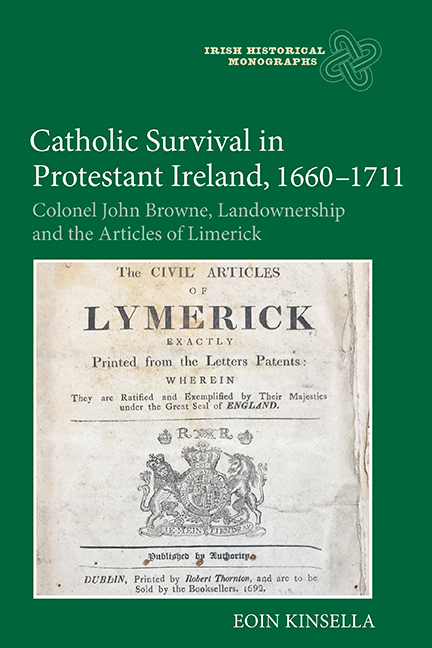 Catholic Survival in Protestant Ireland, 1660–1711
Catholic Survival in Protestant Ireland, 1660–1711 Book contents
- Frontmatter
- Dedication
- Contents
- List of Illustrations
- Acknowledgements
- List of Abbreviations
- Editorial Note
- Glossary
- Introduction
- Part I The Rise and Fall of the ‘New Interest’
- Part II The Articles of Surrender
- Part III Article 13 of Limerick
- 6 ‘This clause was surreptitiously obtained’: Implementing article 13 of Limerick, 1691–8
- 7 ‘I fear a bill relating to me be gone for England’: Implementing article 13 of Limerick, 1698–1708
- 8 ‘I am plagued with a quarrel’: The Browne family and the gentry of Connacht, 1692–1711
- Conclusion
- Appendix A Articles of Surrender, 1690–91
- Appendix B Hearings scheduled for adjudication under the articles of Limerick, 1694
- Appendix C Proclamations of 7 July & 1 August 1691; ‘A copy of and answers to several complaints made by the Irish by their agent Mr Cockly’
- Bibliography
- Index
6 - ‘This clause was surreptitiously obtained’: Implementing article 13 of Limerick, 1691–8
from Part III - Article 13 of Limerick
Published online by Cambridge University Press: 28 June 2018
- Frontmatter
- Dedication
- Contents
- List of Illustrations
- Acknowledgements
- List of Abbreviations
- Editorial Note
- Glossary
- Introduction
- Part I The Rise and Fall of the ‘New Interest’
- Part II The Articles of Surrender
- Part III Article 13 of Limerick
- 6 ‘This clause was surreptitiously obtained’: Implementing article 13 of Limerick, 1691–8
- 7 ‘I fear a bill relating to me be gone for England’: Implementing article 13 of Limerick, 1698–1708
- 8 ‘I am plagued with a quarrel’: The Browne family and the gentry of Connacht, 1692–1711
- Conclusion
- Appendix A Articles of Surrender, 1690–91
- Appendix B Hearings scheduled for adjudication under the articles of Limerick, 1694
- Appendix C Proclamations of 7 July & 1 August 1691; ‘A copy of and answers to several complaints made by the Irish by their agent Mr Cockly’
- Bibliography
- Index
Summary
One of the most controversial aspects of the articles of Limerick was the protection, enshrined in article 13, for the payment of debts owed by John Browne to his Protestant creditors and which predated the outbreak of the war. The article stated that the assets Browne had put aside to pay his debts had been commandeered by Tyrconnell and Sarsfield, and put to use supplying the Irish army. Browne had been promised compensation, but this was an undertaking that obviously could not be fulfilled following the defeat of the Jacobites. Article 13 transferred responsibility for the Jacobite administration's debt to Browne to all estates held by Irish Catholics after the war, by virtue of ‘articles and capitulations’. Sarsfield was required to certify the amount of money owed to Browne by the Jacobite government within twenty-one days of the signing of the articles. By 1692 the majority of the articlemen had reluctantly agreed to honour the terms of article 13 through the payment of a special levy, equivalent to one year's quit-rent. The intended beneficiaries were, uniquely under the articles of surrender, mostly Protestant. Browne too stood to gain by staving off financial ruin, but article 13 was, in theory and eventual implementation, punitive to his fellow Catholic landowners.
As a result, the usual pattern of Catholic lobbying in relation to the articles of surrender was reversed. Article 13 created an anomalous situation where articlemen actually sought to prevent the implementation of one of the articles of Limerick. The quit-rent levy imposed by the article was, however, vital to John Browne's efforts to repay his debts and he pursued its implementation vigorously. Between 1692 and 1705, Browne joined forces with his creditors to lobby for legislation to implement the article and to thwart any opposition. Browne and his creditors employed agents in Dublin and London to argue their case, where they were opposed by the articlemen. Rather than lobbying for as broad an interpretation as possible, as they had done with the remaining articles, the articlemen sought to restrict the scope of article 13 as narrowly as possible.
The articlemen and protectees argued against article 13 before the Irish and English privy councils. They were in fraught territory. Objections had to be carefully worded so as not to appear to question the legality or binding nature of the articles as a whole.
- Type
- Chapter
- Information
- Catholic Survival in Protestant Ireland, 1660–1711Colonel John Browne, Landownership and the Articles of Limerick, pp. 147 - 177Publisher: Boydell & BrewerPrint publication year: 2018
